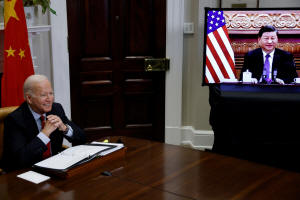Biden looks to tamp down Taiwan tension during China Xi call
 Send a link to a friend
Send a link to a friend
 [July 28, 2022]
WASHINGTON (Reuters) -U.S.
President Joe Biden and China's Xi Jinping will hold their fifth call as
leaders on Thursday, as concerns rise over a possible visit to
Chinese-claimed Taiwan by U.S. House Speaker Nancy Pelosi. [July 28, 2022]
WASHINGTON (Reuters) -U.S.
President Joe Biden and China's Xi Jinping will hold their fifth call as
leaders on Thursday, as concerns rise over a possible visit to
Chinese-claimed Taiwan by U.S. House Speaker Nancy Pelosi.
White House officials have said the long-planned call, scheduled for
8:30 a.m. (1230 GMT), will have a broad agenda, including discussion of
Russia's invasion of Ukraine, which China has yet to condemn.
At its core, U.S. officials see the exchange as another chance to manage
competition between the world's two largest economies, whose ties are
increasingly clouded by tensions over democratically governed Taiwan,
which Xi has vowed to reunite with the mainland, by force if necessary.
Beijing has issued escalating warnings about repercussions should Pelosi
visit Taiwan, a move that would be a dramatic, though not unprecedented,
show of U.S. support for the island, which says it is facing increasing
Chinese military and economic threats.
Washington does not have official relations with Taiwan and follows a
"one-China" policy that recognizes Beijing, not Taipei, diplomatically.
But it is obliged by U.S. law to provide the island with the means to
defend itself, and pressure has been mounting in Congress for more
explicit support.
"This is about keeping the lines of communication open with the
president of China, one of the most consequential bilateral
relationships that we have, not just in that region, but around the
world, because it touches so much," White House national security
spokesman John Kirby told reporters on Wednesday.

One person briefed on planning for the call said the Biden
administration thinks leader-to-leader engagement is the best way to
lower tensions over Taiwan.
Xi has an interest in avoiding a tense confrontation with the United
States as he seeks an unprecedented third term in office at a congress
of China's ruling Communist Party, which is expected in October or
November, some analysts believe.
Biden also wants to discuss climate and economic competition issues, the
person briefed said, as well as the idea of placing a price cap on
Russian oil to punish Moscow for its war in Ukraine, an issue Treasury
Secretary Janet Yellen raised with Chinese counterparts earlier in July.
The Biden administration has been debating whether to lift some tariffs
on Chinese goods as a way to ease soaring inflation, but U.S. officials
have said a decision was not expected ahead of the call.
When Biden last spoke to Xi in March, he warned of "consequences" if
Beijing gave material support for Russia's war, and the U.S. government
believes that that red line has not been crossed in the months since.
[to top of second column]
|

U.S. President Joe Biden speaks virtually with Chinese leader Xi
Jinping from the White House in Washington, U.S. November 15, 2021.
REUTERS/Jonathan Ernst

A spokesman for China's foreign ministry declined to confirm that
the call would take place or share details when asked about it
during a regular briefing in Beijing on Thursday.
"The Chinese and U.S. heads of state maintain communication using
various means," Chinese foreign ministry spokesman Zhao Lijian said.
"China will announce information about this in a timely manner," he
said.
TOXIC TIES
The White House has reiterated that its "one-China" policy has not
changed despite speculation over a possible trip by Pelosi, which
the speaker has yet to confirm.
The last time a speaker of the U.S. House of Representatives visited
Taiwan was in 1997, and as a co-equal branch of government, the U.S.
executive has little control over congressional travel.
China has grown more powerful militarily and economically since, and
some analysts worry such a visit at a time of fraught ties, could
spur a crisis across the 100-mile (160-km) wide Taiwan Strait
waterway separating China and Taiwan.
"The relationship is in such a toxic state. Mutual distrust is
really at an all-time high. I think people don't realize how
dangerous this particular moment is," said Bonnie Glaser, a China
expert at the German Marshall Fund of the United States.
She said Biden and Xi needed to focus their call on de-escalation,
including possible mechanisms to reduce the risk of mishaps.
Kirby said the administration has been in touch with Pelosi's office
to make sure she has "all the context" she needs to make decisions
about her travel.
China has given few clues to specific responses it might take if
Pelosi, a long time critic of China, particularly on human rights
issues, does go to Taiwan.

Martin Chorzempa, a senior research fellow at the Peterson Institute
for International Economics, said playing up the Taiwan issue could
serve Xi as a domestic distraction from China's slowing economy, but
"any reaction strong enough to trigger U.S. sanctions would create
massive damage to China and the world economy."
(Reporting by Michael Martina, Trevor Hunnicutt, David Brunnstrom
and Jarret Renshaw; additional reporting by Martin Quin Pollard in
Beijing. Editing by Heather Timmons, Richard Pullin, Raju
Gopalakrishnan and Philippa Fletcher)
[© 2022 Thomson Reuters. All rights
reserved.]
This material may not be published,
broadcast, rewritten or redistributed.
Thompson Reuters is solely responsible for this content. |